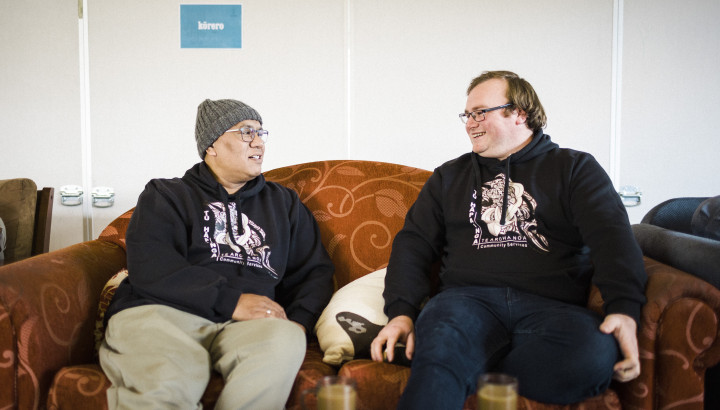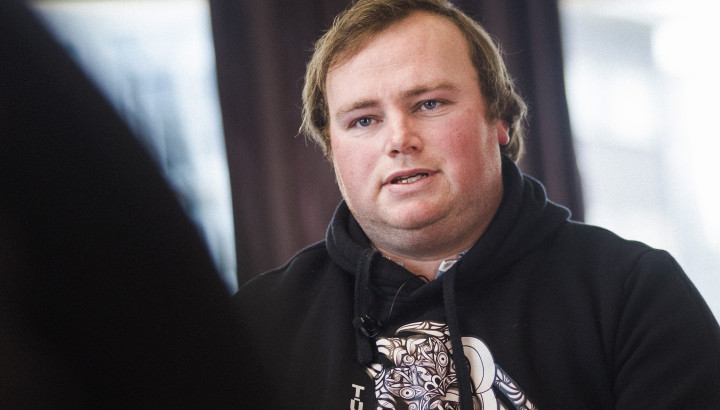Josh shares how he joined a men's group which changed his life forever. Through the group Josh learned the power of vulnerability and the importance of seeking help when needed.
Soft piano music plays continuously in the background for the duration of the film. On a black screen is the text ‘Warning. This video contains coarse language and discussions of violence. Viewer discretion is advised.’
Josh, a pākehā guy with dark blonde hair walks hand in hand with his daughter. Josh is wearing a black sweatshirt with a traditional Māori design on it in white, and black pants. His daughter, whose face is not shown throughout the video, has chin length blonde hair. She is wearing a blue sweatshirt, leopard print leggings and red framed glasses, and looks about four years old.
Josh: “I am Josh and I've ah just hit the 30 mark.”
Cut to Josh, standing under an enormous tree, facing the camera, and holding his daughter in his arms. She has her arms around his neck. White text appears on the screen – ‘taking steps for change’.
Josh: “All of that bottling everything up, pushing it down, all came from probably the picture that I had of what a male should have been. You know that strong person. While we live in a twenty first century with the roles are changing a bit, that to me that was a strong person, look after your family provide you know…”
Cut to Josh in the park, standing under a large tree. He is wearing glasses in this scene. In the next shot Josh is in the same place, holding his daughter in his arms. She hugs him and gently pats his face.
“be the battling ram of everything, and then it's not until you know, another pebble falls … that it really rears its ugly head, and shows you exactly you know what the frustration meant, and what the …I'm calling it frustration but it's anger. … I developed a lot of anger, and for a good couple of years there I just pushed it back down.”
Cut back to Josh in the lounge.
Josh: “You know I think we grew up in a world where anger is negative, and everything around anger has become negative."
Cut to a scene of Josh and Chris, the facilitator of the men’s group (At Te Aroha Noa Community Services), drinking tea in a community centre from brown glass mugs. Chris is a middle-aged Māori man wearing the same black sweater as Josh. He is wearing a grey beanie. The scene is in slow motion, and they chat inaudibly as Josh’s voiceover continues.
Josh: “It was only it was only probably a year or so ago that I learned that it’s okay to be angry … it’s how we channel that anger and what we do with that anger.”
Cut back to Josh in the lounge.
Josh: “Because I lost all control and anger, I ended up spending a weekend in a police cell and consequently that was the time where I was going through the you know ‘you may not see your daughter again’ you know and um, and then I was like ‘Nah. This is the change. I have to see my daughter ... I may not be together with my ex but I'm gonna see my daughter.’"
Cut to Josh and his daughter playing in a playground, in slow motion. They spin on the roundabout ride, and he pushes her on a swing.
Josh: “It wasn't until I attended the group, the men's group, that I actually learned that I needed to let go of a lot of past trauma.”
Cut back to Josh in the lounge.
Josh: “And actually not blaming other people. I blamed everybody else, … I said, ‘it was their fault, it was their fault, I'm fine, I'm an angel’, you know. So, once I let go of that idea that I was, God basically, then the change just came easy.
How did letting go feel? To me it felt great. It was scary, to be fair. That the first letting go factor was scary as hell. The group that was created, at Te Aroha Noa, was just fantastic.”
Cut to Josh and Chris outside Te Aroha Noa Community Centre, gripping hands and leaning in to hongi, in slow motion.
Josh: “It was working with some of the men in the group and realising that my idea of what a man should be was a lot different to what other people have.”
Cut back to Josh in the lounge.
Josh: “So it was morphing those, all those ideas together, to what I now know, what I feel like a man is. You're not any weaker for accepting help, you're not any weaker for walking through and going ‘you know it made me feel sad.’ The group previous, … we had a person sitting here saying ‘no you can't be angry, you know, and we need to find ways that you can't be angry" whereas the other men's group was like ‘yeah bro, you can be angry, but don't go doing that [ __ ].’”
Cut to Josh and his daughter spinning on the roundabout ride in slow-motion.
Josh: “… ‘Don't go do that, do this instead, let's go and have a fish, or let's go out and have a hunt, or let's just go for a walk.’”
Cut back to Josh in the lounge.
Josh: “The real reason I've changed for me, was that setting. You know, it sounds really simple but counting to ten, as hard as it is in the moment, when you're seeing red, or you're really angry, you do need to take a moment and count to ten.
The contribution of other people and the change - to be honest it would be probably my daughter's mother. She recognised what I wanted to achieve and she's like ‘okay, so we're not going to allow that to happen again.’ But it was actually the great freedom of being able to just pop in whenever I needed. So, you know, we're in a twenty-first century world, and we have co-parenting now [Josh makes air quotes with his fingers], and that works well. I pop in, she comes in, whenever we need each other and stuff, so that was the biggest person.
And to be fair, my parents as well. For mum, if I'm giving her a call and saying, ‘something's not quite right’ she'll say, ‘Oh go give Chris a call, or go to someone else a call, because [it’s] a little bit past me.’ And that's what I do, I give him a buzz, and generally that's enough.
You know my dad has the other aspect, he's the positive ‘Yeah you're okay, you know, you're doing it.’ A man of few words but that's cool, on the same path, which is great. That's what I needed.”
Cut to Josh and his daughter walking away on a path in the park, away from the camera.
Josh: “Before I would be like ‘oh [ __ ] sake’ you know, and I'm just like ‘oh bother’ [laughs] you know, like ‘oh no.’”
Cut to Josh’s daughter, sliding down the slide in the playground, her arms stretched out. Josh catches her at the bottom of the slide.
Cut to a black background, white words appear. ‘In your hands. Change starts here. For you and your whānau. If you think it might be time to change your behaviour, you’re in the right place. One step at a time is all it takes for progress.’

